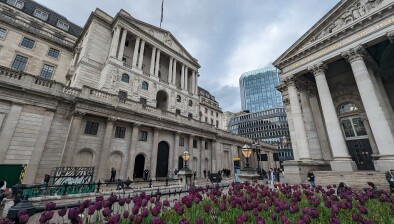Bank of England: Britain set for strongest economic growth since WWII

The UK is set to experience the strongest economic growth since the Second World War this year, with a faster-than-expected recovery from the coronavirus pandemic, according to the Bank of England.
The bank has hiked its estimate for UK GDP growth to 7.25% in 2021, up from February’s forecast of 5%, as rapid progress with the Covid-19 vaccine and easing of restrictions leads the way for a boom in pent-up demand.
The growth rate would be the fastest since an 8.7% expansion in 1941, when production was increased for the war effort. However, the rise follows a collapse of almost 10% in 2020, the worst decline for more than three centuries.
Setting out upbeat forecasts for growth and jobs as the economy reopens, the Bank’s rate-setting monetary policy committee (MPC) voted unanimously to keep interest rates at the record low of 0.1%.
Yesterday, Andrew Bailey, the bank’s governor, said there was “very strong, good news” from the economy as lockdown was relaxed. However, he warned that two years of GDP growth had been lost to the global health emergency and said there were still risks on the horizon.
He said: “Let’s not get carried away. It takes us back by the end of this year to the level of output we had essentially at the end of 2019, pre-Covid. So that is good news in the context of where we’ve been, but it still means two years of output growth have been lost to date.”
The Bank of England said it expected the UK economy to recover its pre-pandemic level by late 2021 and that unemployment would hit a much lower peak than previously forecast.
The Bank said rising consumer spending would help fuel the rebound, driven by more than £200bn in additional savings built up during lockdown, as well as a rise in confidence thanks to the Covid vaccine.
Howard Archer, chief economic advisor to the EY ITEM Club, said that there was never any real doubt that the Bank of England’s Monetary Policy Committee (MPC) would either leave interest rates unchanged at 0.10% or maintain the targeted stock of asset purchases at £895bn.
He said: “However, while there a unanimous 9-0 MPC vote for the interest rate decision, one MPC member – Andy Haldane – voted to reduce the asset purchase target by £50bn, reflecting his upbeat view of the economy and concerns over the upside risks to inflation.
“Overall, while the Bank England is clearly more positive about the UK economy in the near-term, the MPC also has significant uncertainties about the longer-term outlook and are seemingly in no hurry to tighten monetary policy. The May minutes conclude that ‘The MPC will continue to monitor the situation closely and will take whatever action is necessary to achieve its remit.”
Mr Archer concluded: “The Committee does not intend to tighten monetary policy at least until there is clear evidence that significant progress is being made in eliminating spare capacity and achieving the 2% inflation target sustainably.’”








